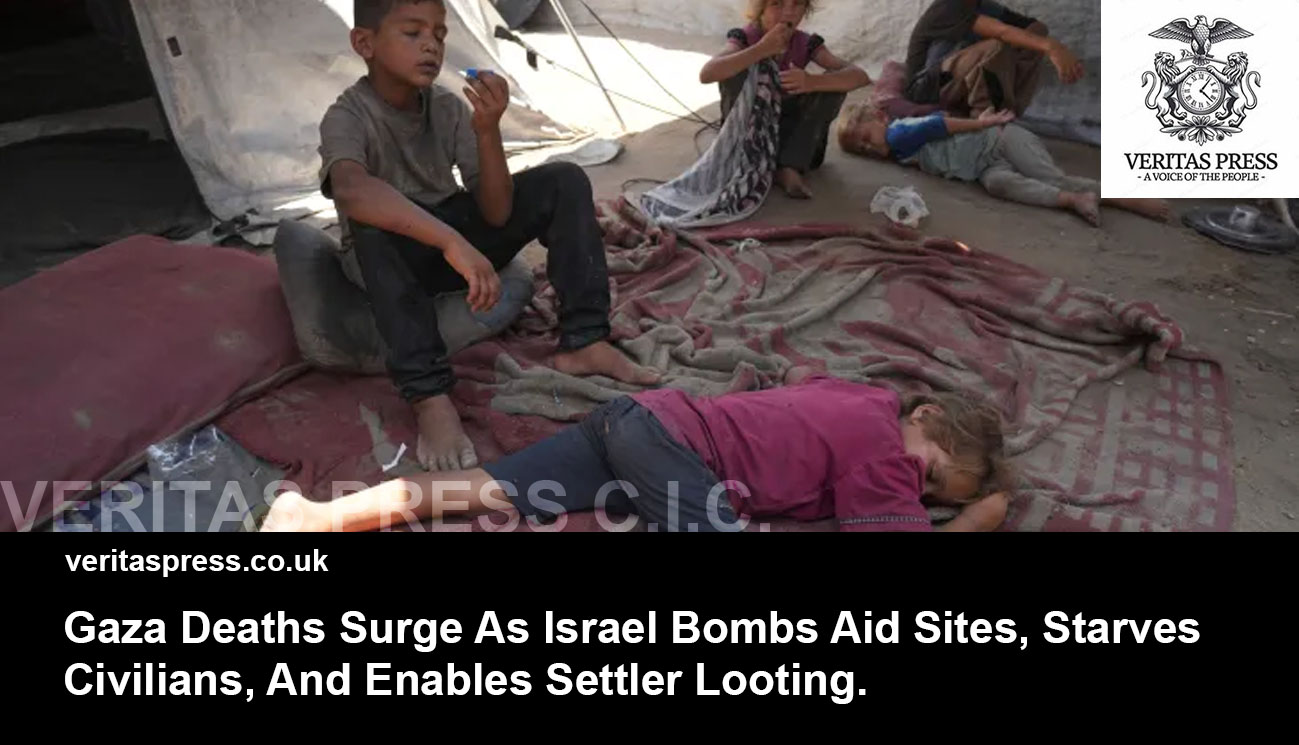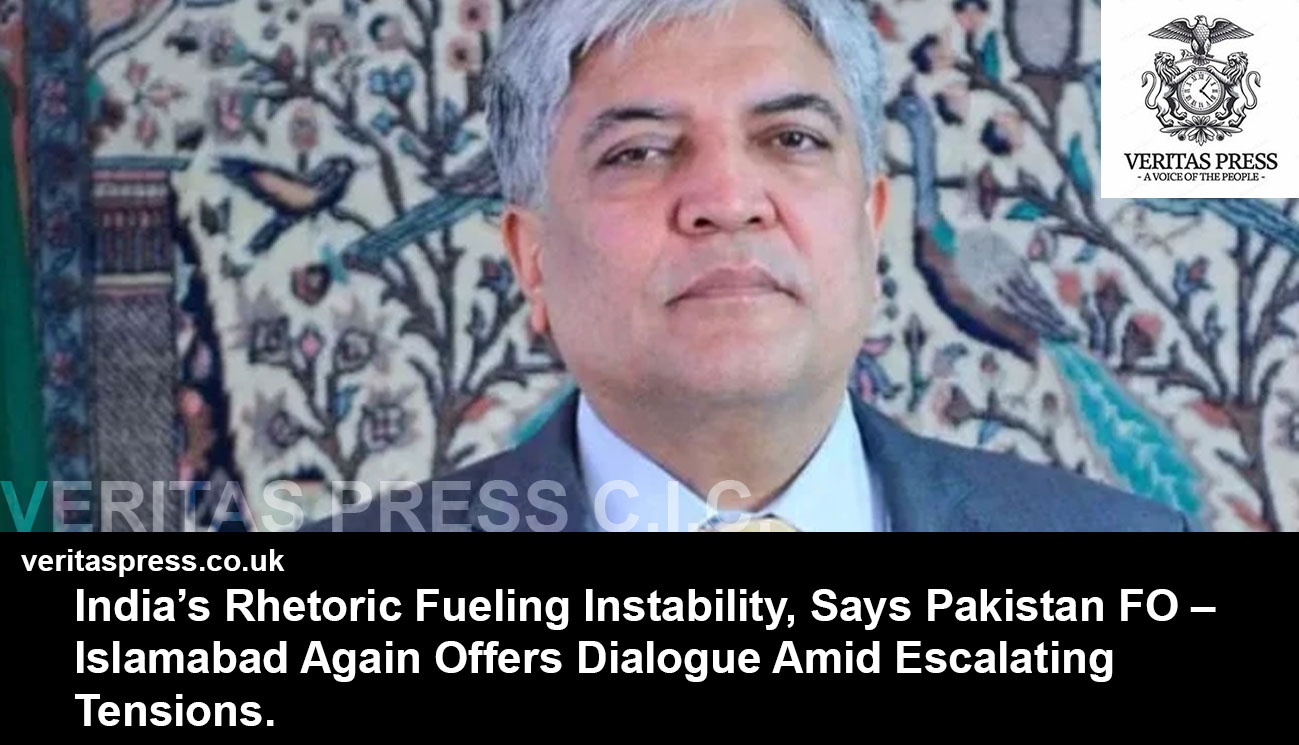Press Release: Veritas Press C.I.C.
Author: Kamran Faqir
Article Date Published: 02 Aug 2025 at 12:52 GMT
Category: Middle East | Palestine-Gaza | US-Israel At War
Source(s): Veritas Press C.I.C. | Multi News Agencies
Gaza Strip – Israeli military assaults and a deliberate policy of starvation have led to a surge in civilian deaths in the besieged Gaza Strip, where at least 24 Palestinians, including 13 aid seekers, were killed on Saturday alone. As Israeli forces continue targeting shelters, homes, and food distribution sites, humanitarian officials and eyewitnesses warn that famine is no longer a looming threat; it is already here.
More than 163 Palestinians, including 92 children, have now died from hunger and malnutrition since Israel’s total blockade began in March, according to the Gaza Health Ministry and medical sources. But far from being an unintended consequence of war, critics argue the famine is a deliberately orchestrated tool of collective punishment.
“This is not just neglect, it is a method of extermination,” said Dr. Rami Aboud, a paediatrician at Al-Shifa Hospital in Gaza City. “When you cut food, bomb aid trucks, shoot starving civilians, and allow settlers to loot supplies, it is not random. It is systematic.”
Targeting The Starving:
On Saturday, Israeli forces opened fire on aid seekers near the Netzarim Corridor, killing at least 12 and injuring over two dozen, according to eyewitnesses and the Palestinian Red Crescent Society (PRCS). Similar attacks occurred in Wadi Gaza, where five people were fatally shot while queuing for food. Meanwhile, an airstrike on a camp sheltering displaced people west of Khan Younis killed three.
“People risk their lives for flour,” said Amal Khaldi, a 42-year-old mother from central Gaza. “You go with your children and pray not to be shot or trampled. Sometimes you return with nothing. Sometimes you don’t return at all.”
The PRCS reported more than 90 injuries on Saturday alone as Israeli forces fired into crowds gathered around humanitarian distribution points. “These are not accidents. These are repeated, intentional assaults on people trying to survive,” said Mahmoud Daher, PRCS spokesperson.
A Humanitarian System In Collapse:
Despite international appeals, just 73 aid trucks entered Gaza on Friday, far short of the 500-600 trucks per day the UN Office for the Coordination of Humanitarian Affairs (OCHA) says are needed to meet basic food needs.
Even that limited aid rarely reaches its destination intact. Gaza’s government media office said much of the humanitarian cargo is now intercepted by Israeli settlers and armed gangs, who loot and hoard the supplies before reselling them at exorbitant prices.
“This lawlessness is not organic; it is manufactured,” said Nour Odeh, Palestinian political analyst and former spokesperson for the Palestinian Authority. “Israel has dismantled all civil authority in Gaza, then allowed chaos to take over, knowing full well what would happen to the aid.”
Local media and residents say Israeli settlers, some linked to far-right militias, have been seizing aid trucks entering through the Netzarim axis, looting their contents and reselling them for two to three times the black-market price.
“Even when food gets in, it doesn’t get to us,” said Majed Sulaiman, a displaced father of six in Deir al-Balah. “It’s controlled by gangs and settlers. You need cash or weapons to access it. We have neither.”
In a public statement, Gaza’s government media office condemned what it called Israel’s “systematic and deliberate imposition of security chaos,” accusing it of weaponising starvation through “closure of crossings, obstruction of aid, and the empowerment of lawless actors.”
Entire Families Wiped Out:
The destruction continues far from the aid lines. In Al-Zawaida, an Israeli airstrike on the home of the al-Qurainawi family killed a father, mother, and their three children in a single strike. In Gaza City’s Shujaya district, three more civilians were killed in a targeted airstrike, while separate attacks in Yarmouk, Rafah, and Deir al-Balah claimed additional lives.
“We are not living. We are dying slowly in pieces,” said Layla Nassar, a university student now living in a tent in Khan Younis. “There is no food, no water, no medicine, and when we try to get help, we are bombed.”
The Gaza Health Ministry reported that 82 Palestinians were killed on Friday alone, including 49 people seeking aid, and over 550 were injured. That brought the total killed since March to 9,163, and the overall death toll since October 2023 to over 100,000, with more than 377,000 injured.
Whistleblower Exposes Aid Site Abuses:
A former U.S. military contractor assigned to a U.S.-Israeli humanitarian aid project in Gaza has now gone public with chilling revelations.
Anthony Aguilar, a 25-year U.S. military veteran, served as a security guard at a site run by the Gaza Humanitarian Foundation (GHF), a controversial American-Israeli entity operating in Rafah. In an interview with Al Jazeera, Aguilar described the conduct of Israeli forces at aid sites as “abhorrent, deliberate, and cruel.”
“They control the crowd using machinegun fire, mortars, artillery, and even Merkava tanks,” Aguilar said. “I’ve served in combat zones around the world. I’ve never seen anything like this. It’s not about controlling a crowd. It’s about punishing them.”
He added that so-called “warning shots” were fired from belt-fed machine guns, a tactic he called unprecedented and unlawful.
“The whole process is designed for chaos. Civilians are let in all at once. There’s a stampede. Then shots are fired. I watched people die for trying to grab a bag of flour.”
Aguilar’s testimony has added to mounting concerns about militarised aid delivery, which critics say has turned relief operations into zones of trauma and death.
Experts: Starvation Is A War Crime And A Strategy.
International humanitarian law experts say Israel’s actions meet the legal threshold for war crimes. Article 54 of Additional Protocol I to the Geneva Conventions explicitly prohibits the starvation of civilians as a method of warfare. The Rome Statute of the International Criminal Court similarly classifies the act as a prosecutable war crime.
“Israel’s blockade and targeting of aid seekers is not collateral, it is policy,” said Dr. Michael Lynk, former UN Special Rapporteur on Human Rights in the Occupied Palestinian Territory. “We are witnessing the intentional infliction of suffering through hunger, and that is a crime.”
In March, UNRWA, the World Food Programme, and Médecins Sans Frontières warned of famine conditions in northern Gaza, exacerbated by Israel’s refusal to allow meaningful humanitarian access. On Friday, the UN Human Rights Council issued a statement saying starvation is being used “deliberately and systematically” as part of Israel’s war strategy.
Human Rights Watch and Amnesty International have separately called for immediate investigations into Israel’s conduct, including the targeting of aid sites and destruction of civilian infrastructure essential for survival.
U.S. Complicity And Global Silence:
Despite the growing mountain of evidence, accountability remains elusive. The United States continues to provide Israel with weapons, funding, and diplomatic cover at the UN Security Council, blocking resolutions that call for an immediate ceasefire.
“The U.S. is not just standing by, it’s complicit,” said Sarah Leah Whitson, Executive Director of DAWN (Democracy for the Arab World Now). “By financing Israel and shielding it from accountability, Washington is enabling famine and mass atrocities.”
Aid workers, analysts, and survivors alike warn that unless international pressure intensifies, Gaza’s humanitarian collapse will soon become irreversible.
“This is not a natural disaster. It’s a political one, *calculated, brutal, and supported by silence,” said Raji Sourani, director of the Palestinian Centre for Human Rights in Gaza. “The world knows. The world watches. And still, the siege tightens.”
Conclusion: Starvation By Design, Silence By Choice.
What is unfolding in Gaza is not a humanitarian crisis in the traditional sense; it is a deliberate policy of siege, starvation, and systematic dehumanisation. The Israeli government, backed by U.S. arms and diplomatic cover, has imposed a total blockade that denies food, fuel, and medical supplies, while systematically targeting shelters, hospitals, and distribution centres. It has turned breadlines into kill zones, bombed tents full of displaced families, and transformed hunger into a weapon of war.
But the assault doesn’t end with the airstrikes. Israeli settlers and local gangs continue to loot aid trucks, destroy food supplies, and resell what remains at exorbitant prices, making basic goods unaffordable for starving Palestinians. Operating with impunity in a lawless vacuum created by Israel’s military policies, these actors have become profiteers of famine. The result: food meant to save lives has become an instrument of death, fuelling a starvation crisis that has already claimed at least 163 lives, including 92 children.
And yet, Israeli officials continue to flood the international stage with propaganda, falsely presenting the siege as a humanitarian effort. While children starve and families are gunned down seeking food, government spokespeople tout “security procedures” and “food corridors” that do not exist in any meaningful or consistent form. These narratives are not just misleading; they are cover stories for a policy of calculated deprivation.
This is not collateral damage. It is a strategy.
Starvation as a method of warfare is prohibited under international law. The Rome Statute of the International Criminal Court and the Geneva Conventions explicitly outlaw it. And still, it is being implemented in Gaza with precision; its tools include missiles, checkpoints, embargoes, and manipulated aid. Its outcomes are emaciated children, looted convoys, bombed shelters, and unburied bodies.
As Gaza’s children waste away and aid seekers are gunned down, the international community faces a choice. Continued complicity, or urgent intervention to end what Palestinians, aid groups, and legal experts increasingly describe as a genocide in slow motion.
While the international community observes. Governments that could intervene, by properly regulating arms sales, invoking international law, or demanding open crossings, choose instead to equivocate or enable. Aid groups and UN officials raise the alarm, only to be met with inaction, deflection, or accusations of bias.
If international law is to mean anything, if famine, mass displacement, and child death are not to become normalised tools of modern warfare, then Gaza must be a reckoning. Not just for Israel’s leadership, but for the international system that has enabled these crimes through silence, complicity, and double standards.
This is not a war against Hamas. It is a war against the very infrastructure of Palestinian life, against food, water, medicine, and memory. A war that starves the body and erases the future.
History will not ask whether the world knew. It will ask why, knowing it chose to look away.
Tags:




























Leave a Reply